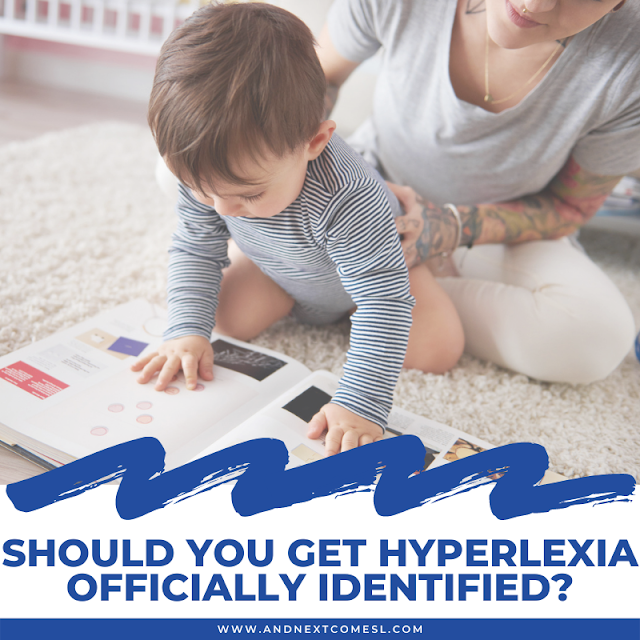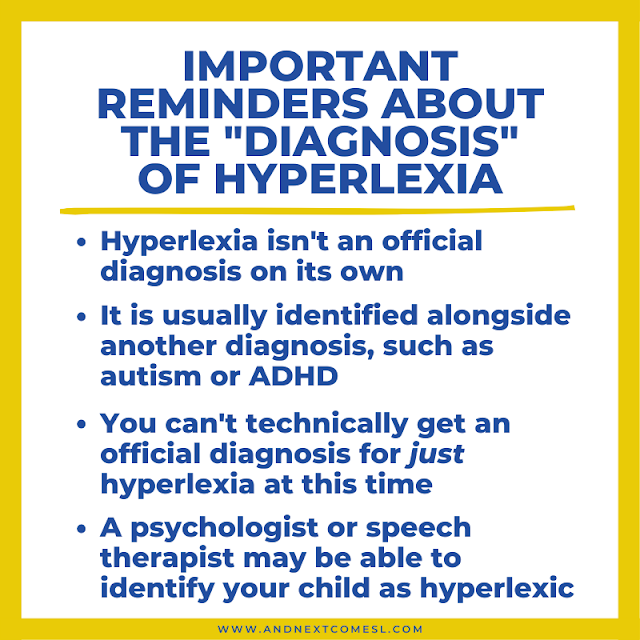A couple of months ago, someone on Instagram asked the following question: "Is there a need to get hyperlexia medically diagnosed or should parents simply assume that it is hyperlexia?"
I thought it was a great question. One worth digging into deeper as I'm sure many other parents are wondering the same thing. Proof lies in the fact that you are here reading this right now...Right?
Anyway, interestingly enough, when I polled my Instagram audience, only a small fraction had actually had their child professionally identified as hyperlexic.
It turns out that the majority had self-diagnosed or self-identified hyperlexia in their child, which I found fascinating!
And honestly, there are good reasons to explain why self-diagnosis is so common when it comes to hyperlexia, which I'll get into later.
So, let's take a look at whether or not you should get hyperlexia officially identified. In doing so, we'll take a look at some of the reasons why you might want to get an official "diagnosis," as well as some of the barriers you might face along the way.
Important Reminders About the "Diagnosis" of Hyperlexia
First things first, it's important to remember that hyperlexia isn't an official diagnosis on its own. At least not yet. That's the reason I put diagnosis in quotations. I do hope that, one day, it can be a standalone diagnosis much like dyslexia is.
In the meantime though, hyperlexia is something that is usually identified alongside another diagnosis, such as autism or ADHD. You can see what other diagnoses a hyperlexic child might have here. But basically, hyperlexia is given as a practical label to accompany some other form of neurodivergence.
So you can't technically get an official diagnosis for just hyperlexia at this time.
However, a psychologist or speech therapist may be able to identify your child as hyperlexic. There are other types of specialists who might be able to identify hyperlexia as well, but these are the two most common ones that do. You can learn more about how hyperlexia is identified here.
In our case, it was a psychologist who identified my son with hyperlexia and hypernumeracy during his autism assessment so we do have these labels physically written down on paper in his report.
Before you continue reading below, I do strongly encourage you to read this post about understanding the hyperlexia "diagnosis" first.
Regardless, there are lots of reasons to get hyperlexia officially identified. But there are also a ton of barriers that you might face when pursing an official "diagnosis." Which leads me to our next two topics...
Why You Might Want Your Child Officially Identified with Hyperlexia
Here are some of the reasons why you might want to pursue an official "diagnosis" for your hyperlexic child:
- To confirm and validate your child's identity
- Need it written down on paper in order to get proper accommodations at school, to access funding and services, for insurance purposes, etc.
- You're unsure if it's the correct label for your child and want a professional opinion (basically, you want to confirm a self-diagnosis)
- You suspect that your child might have another neurodivergence such as autism, ADHD, or similar in addition to their hyperlexia
- No one will take you seriously without an opinion from a professional. Otherwise, people might think you're just making things up (yes, this happens!). People just don't want to believe that (a) your child started reading as a toddler and (b) that early reading can sometimes also come with a host of language issues. So getting a professional to confirm things can definitely help people believe you and be used to back you up.
Some of these reasons may or may not be strong enough for you to pursue a "diagnosis." That's up to you to decide.
Just be aware that even if you decide you want to get your child officially identified, you might still encounter some pretty big hurdles in the process. Which leads me to...
Barriers to Getting Your Hyperlexic Child Identified
Remember how I said there were good reasons as to why self-diagnosis of hyperlexia is so common? Well, it has to do with the barriers parents face when seeking a "diagnosis" for their child.
Here are some of the most common barriers you might face:
- Cost - Getting a diagnosis can be expensive depending on where you live and whether you are seeking a diagnosis privately or publicly.
- Lengthy wait lists - We're talking over a year or more!
- Finding someone who's familiar with or knowledgeable about hyperlexia - This is the biggest challenge for many families!
- Professionals who dismiss hyperlexia or your concerns (i.e., they don't take hyperlexia seriously, dismiss it as just as meaningless splinter skill, or similar)
Due to these barriers, self-diagnosis is a valid option.
However, I still encourage you to get hyperlexia confirmed by a professional, if and when you can. I'll share a few reasons why next.
Why You Should Eventually Consider Getting a Self-Diagnosis of Hyperlexia Confirmed by a Professional
The presence of hyperlexia can be a sign of another diagnosis or form of neurodivergence, which may require a proper assessment and diagnosis.
In fact, the likelihood is extremely high.
Your child could also be autistic, have ADHD, have a language disorder, apraxia, OCD, or seizures - to name a few - in addition to their hyperlexia. And some of these other diagnoses may require intervention, therapy, medication, or other forms of support.
In other words, hyperlexia can be an indicator of something else going on that you might not have considered or that might need intervention or early support.
That's why I encourage you to get hyperlexia confirmed by a professional, if and when you can. They can help you identify and spot anything else that might be going on.
Doing so can also open you up to additional funding, services, or support depending on where you live, what's available in your area, and what other diagnoses your child might receive.
So even if you don't pursue a professional identification for your child, it's important to monitor your child for signs of other forms of neurodivergence. Then seek a referral and assessment when appropriate, keeping in mind that lengthy wait lists may hinder a timely diagnosis.
To Recap...
Whether or not you should pursue an official "diagnosis" really depends on a lot of factors, as you can see. So here's a quick summary of what was discussed:
- Unsure? Want someone to confirm your suspicions? Suspect something else might be going on and have concerns about their development? Have few barriers? Need official confirmation for funding or services? ➡ Go for an assessment.
- Too many barriers? Have minimal concerns about their development? Don't require an official diagnosis for support, funding, or services? ➡ Go with self-diagnosis and keep your eyes open for signs of other forms of neurodivergence.
If you've decided to pursue an official "diagnosis," then you might want to know more about what's involved. You can read more about how hyperlexia is identified here.
Other Hyperlexia Resources You'll Love
Understanding the Hyperlexia "Diagnosis"







